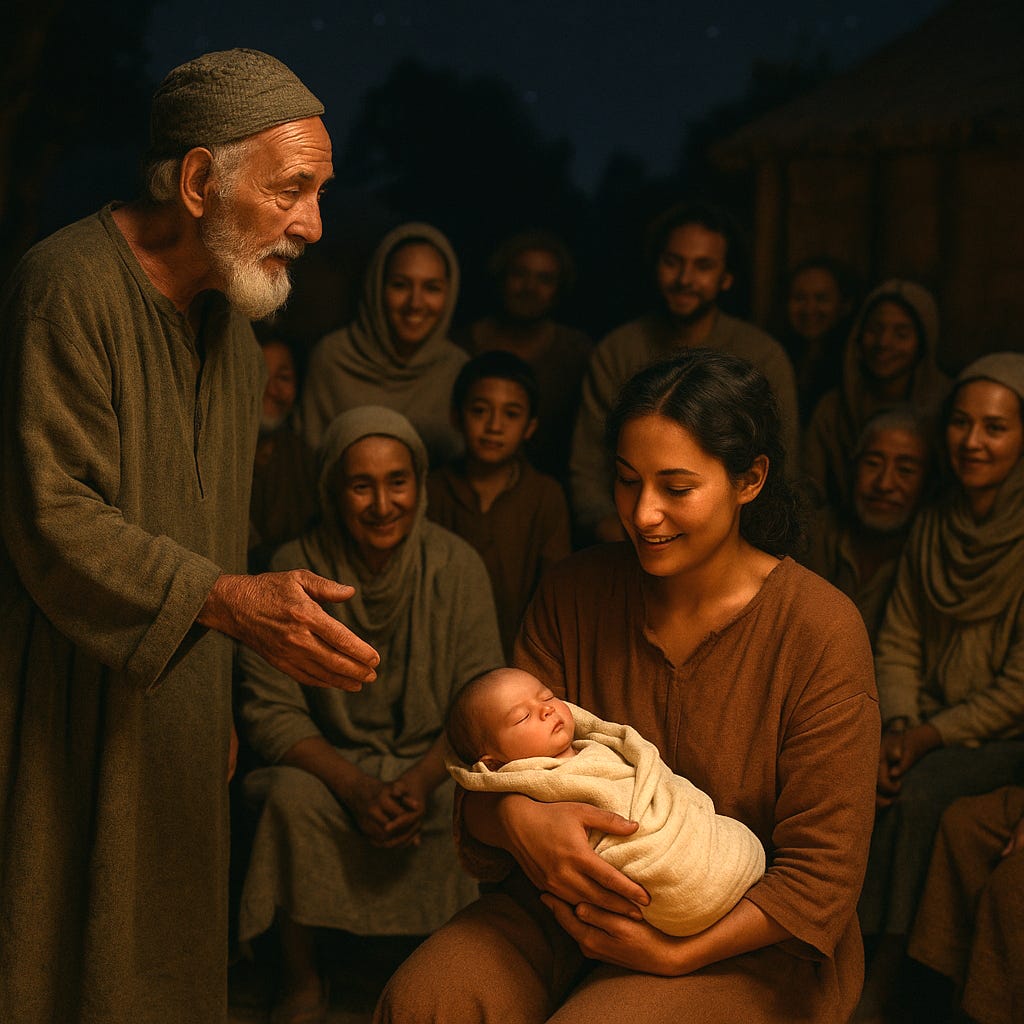Root-Tongue Fragment: The Names of the Village of I
(Recorded from the ash-circle gatherings, spoken by travelers sent to the Village of I who entered the valley and returned with stories. No author is claimed; the words are carried as they were heard.)
The Village of I
It was told that the Village of I is in a valley where the rivers braid like hair, and in that valley a people who speak only in the first person. Each voice is I. No pronoun divides them. And yet - they are not without names.
Our entourage set out with a map that the traveler had drawn for us, and after many days and nights, we came upon the valley and entered the Village of I. We then began our studies. We talked to many townspeople. At first we found their way of speaking strange but eventually became accustomed to it. They too were often confused by how we spoke but their natural openness and friendliness bridged the gap. With their first-person form of speech, they could only consider us part of themselves: as ‘I’s and part of We. They could not conceive of us as ‘other’ as others do not exist in their language.
While the most common references to one another was as ‘I’ we soon discovered that their naming conventions among themselves was much more complex.
The First Naming: Breath and Sign
At birth, when the child takes its first breath, a name is spoken from the signs of that hour. If rain falls, if a dove passes, if dawn breaks across the ridge, these events become the child’s first name.
Thus are remembered: I-born-with-the-rain, I-arrived-when-the-dove-flew, I-opened-my-eyes-as-the-sun-broke.
These are not marks of separation but records of how the One revealed itself in that moment.
The Second Naming: Passage and Deed
When youth crosses into adulthood, a new name is given, born of trial, vision, or deed:
I-who-crossed-the-river, I-who-dreamed-of-fire, I-who-listened-to-the-stone.
These names are lived poems of courage, anchors in the current of time. This name becomes the formal name of each person in the village when they are spoken of by others.
The Third Naming: Elderhood and Continuity
When hair whitens and seasons gather, another name arises, drawn from endurance and memory:
I-who-carried-myself-through-loss, I-who-kept-the-embers-alive, I-who-remembered-the-names-of-all.
Thus an elder becomes a living archive, their name a vessel of communal history.
The Many Names of Intimacy
Yet beyond these are countless others.
Among immediate family each may have a short nickname such as abu, nika, roe, etc. usually only used among themselves.
A childhood friend still calls the grown companion I-born-under-the-oak, for that was the name first known by childhood companions who often still use that name among themselves.
A beloved invents a secret name spoken only at the hearth.
So a single villager may carry fifty names, each a thread of relationship, each a reminder that unity does not erase intimacy.
The Ceremonial Long Name
At festivals or rites of passage, the villagers rise to recite their long names — the chain of every name they have borne in the community. Each becomes a litany of moments:
“I am I-born-with-the-rain,
I-who-dreamed-of-fire,
I-who-stood-on-the-mountain,
I-who-carried-myself-through-loss.
All these are I.”
The fire glows with memory, and the circle hears not biographies but beads on one necklace, many facets of a single jewel.
Reflection in the Ash-Circle
The elders who heard this story once asked:
Is not every being in the forest named already by its birth, its cry, its flight?
Do wolves and geese not carry the One in chorus without needing names at all?
Is language itself what fractures the One into many, or is it the means by which we remember the One’s many faces?
The matter was left unresolved, as is fitting. But they agreed: to speak I is to affirm unity. To speak a name is to honor the moment when unity wore a distinct face at a distinct time in a distinct place under distinct conditions. These are needed, lest memory dissolve or difference divide.
(This fragment is kept in the Root-Tongue archives under the lineage of “I/We,” to be recited when the circle considers the mystery of unity and multiplicity.)





This sounds like learning to understand our identities are not through social individual edicts, but through ongoing creative constructs, where something is unique and is counted only once, even if it appears multiple times---like the multiple shapes, substances, and, colors in the kaleidoscope. The multiple colors, shapes, and substances are shared to create different visual designs, each one being unique, and never the same, either prior to turning, during, or afterwards. However, these elements are not the kaleidoscope itself but it's unending and eternal potential.
As you poignantly stated, (using the example of the kaleidoscope): "The matter was left unresolved, as is fitting. But they agreed: to speak 'I' is to affirm unity. To speak a name is to honor the moment when unity wore a distinct face at a distinct time in a distinct place under distinct conditions. These are needed, lest memory dissolve or difference divide." Well put.
I enjoyed this. This, and sometimes other pieces, call to mind something like a different path we could have taken or perhaps an alternate world. Thanks.